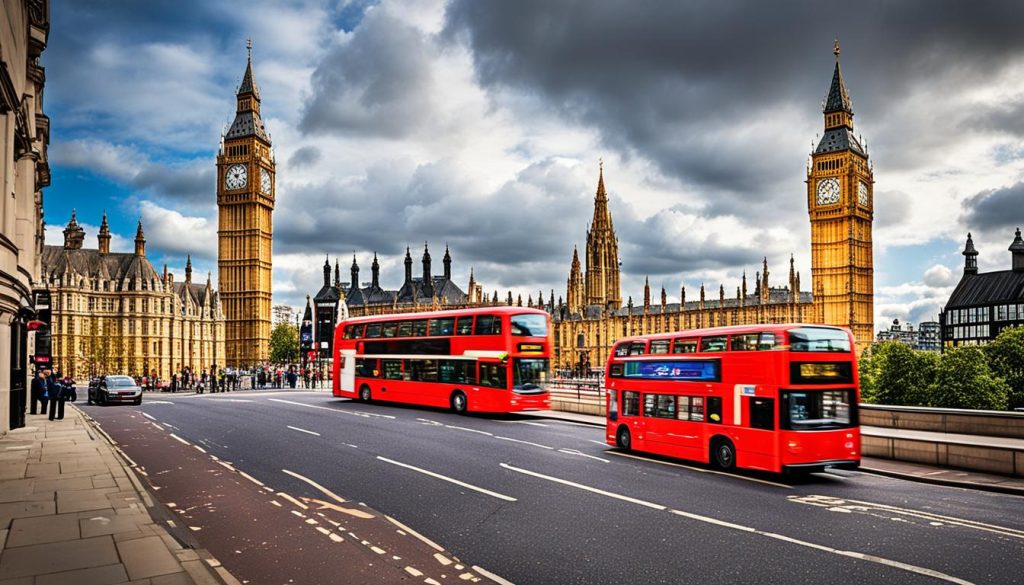The United Kingdom invites everyone who loves to learn its history and enjoy its lively customs. As a place rich in UK history, it showcases events and figures that have influenced the whole world. Here, kings and scholars, fighters and poets have all made lasting impacts, adding to the famous British culture.
In the UK, the lively cities and peaceful countryside show a country of many sides coming together perfectly. It’s famous for its landmarks and its worldwide influence. Discover British facts that tell a story as fascinating and long-lasting as the nation. Let’s explore the iconic UK, where history and legacy blend to create a one-of-a-kind journey.
The United Kingdom’s Diverse Geography

The United Kingdom is a place of beauty that draws visitors and artists alike. It’s a mix of natural scenes and history. Its geography ranges from mountains to coastlines, making it a source of pride.
Natural Wonders from the Scottish Highlands to the Cornish Coast
In the Scottish Highlands, you’ll find towering mountains and clear lochs. This area captures Scotland’s wild beauty. As you go south, you pass the calm Lake District and the Yorkshire Dales. You end up at the Cornish Coast, with its cliffs and beaches, dotted with small fishing villages.
Significance of the English Channel and North Sea
The English Channel has always been important. It’s seen migrations, invasions, and trade, connecting the UK to Europe. The North Sea, with its choppy waters, has cliffs and beaches. It has been key for trade and a challenge for sailors over time.
Majestic National Parks Across the UK
The UK loves its national parks. They range from Scotland’s Cairngorms to Dartmoor’s hills. These parks protect wildlife and offer stunning views. They’re perfect for those who love walking, climbing, and nature.
- The Peak District shows the UK’s history with its beauty and old villages.
- Snowdonia has tall mountains that offer adventures and are home to rare animals.
- The New Forest, once for royal hunts, now lets people explore ancient woods and see wild ponies.
These places and parks show the UK’s variety and charm. It’s a country full of places to discover.
A Monarchy with a Rich History
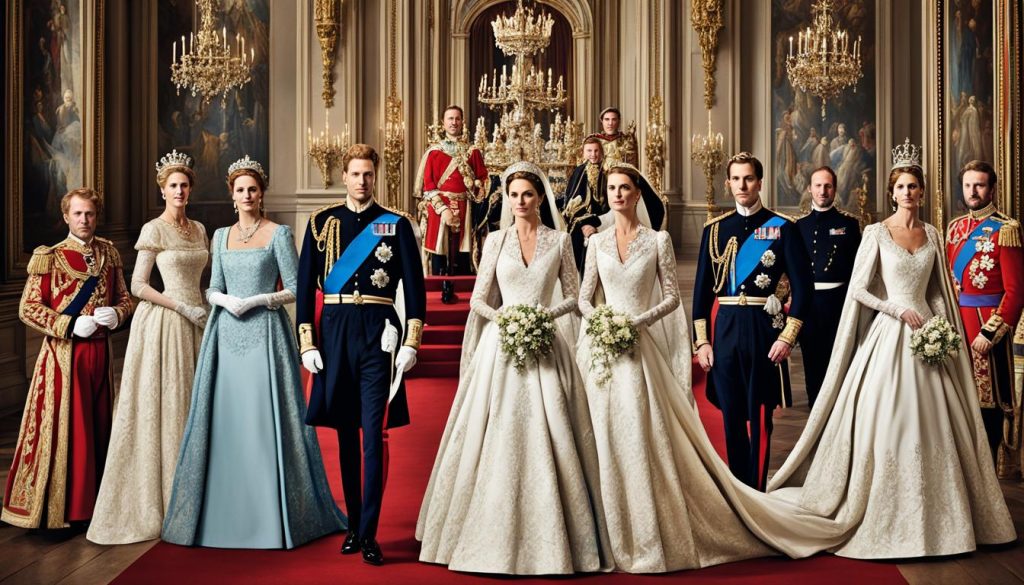
The British Monarchy is more than a piece of history. It’s a vivid representation of the nation’s grand past. One of the oldest monarchies in the world, it still fascinates people everywhere. Its mix of history, Royal Family charm, and modern appeal is unique. This part looks into the crown’s magic. We explore the beauty of historic UK palaces, the impressive British castles, and how royal traditions continue today.
The Royal Family and its Centuries-Old Heritage
The history of the British crown goes back a long way. Each king and queen has added to the Royal Family’s story. The UK has seen big events under the monarchy. These events have not just shaped the country but the world too. They have left a legacy that lasts centuries.
Historic Palaces and Castles Dotting the Landscape
- Buckingham Palace: A symbol of the monarchy’s enduring presence and a focal point for state occasions and national rejoicing.
- Windsor Castle: The oldest and largest inhabited castle in the world, which has been the family home of British kings and queens for almost 1,000 years.
- Edinburgh Castle: Dominating Scotland’s skyline, this fortress holds the Honours of Scotland, the country’s crown jewels.
Traditions and Ceremonies of the British Monarchy
The British Monarchy stands for ceremony and tradition. These elements are key to British national identity. Below are examples of royal ceremonies:
- The Changing of the Guard: A quintessential display of British pageantry, taking place at Buckingham Palace throughout the year.
- The State Opening of Parliament: A formal event marking the commencement of a session of Parliament, where the Queen’s Speech is delivered.
- Trooping the Colour: A ceremony performed by regiments of the British and Commonwealth armies to celebrate the official birthday of the Sovereign.
The Industrial Revolution and British Innovation
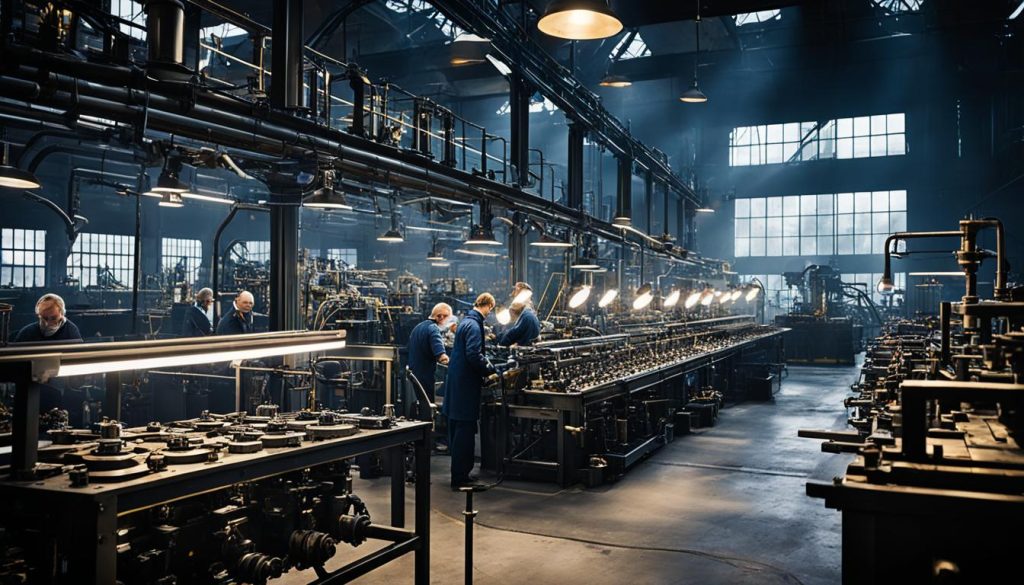
The Industrial Revolution changed the UK from a farm-based economy to an industrial giant. British innovation was key during this time. It led to a worldwide shift in manufacturing processes. This era saw a big boost in UK technology and a focus on engineering excellence. These impacts are still felt in today’s industries.
Looking at British engineering highlights this revolution’s energy. The steam engine, improved by James Watt, not just powered factories. It also helped railways grow, boosting the UK’s economy.
- The cotton gin upped production, transforming the textile industry.
- Blast furnace developments increased iron production, helping with construction and infrastructure.
- Edmund Cartwright’s power loom led to the modern textile industry, making production faster and reducing the need for manual labour.
These key technologies show the era’s endless progress push. British innovation changed not just how things were made but society itself. It reshaped social, economic, and cultural standards. These successes set the stage for later advancements, influencing the 19th and 20th centuries.
Britain’s influence on industry is still significant today, leading to continual progress in science and technology. The UK keeps proving its innovative spirit, staying at the forefront of the global industrial scene.
UK’s Contribution to World Literature
The world of literature would be far less rich without the UK’s influence. Shakespeare’s grand tales and the significant poems from the UK have left a lasting mark. British novelists have captured the interest of readers worldwide for hundreds of years. Today’s British writers add to this remarkable narrative tradition.
The Birthplace of Shakespeare and Other Literary Giants
England is well-known for William Shakespeare, a legendary playwright. Stratford-upon-Avon, his birthplace, draws fans who admire his timeless works. Yet, Shakespeare isn’t the only pillar of British literature. Jane Austen, the Brontë sisters, and Charles Dickens have also crafted stories that delve deeply into life and the human spirit.
Renowned British Novels and Poets
British writers have created unforgettable stories, such as Mary Shelley’s ‘Frankenstein’ and George Orwell’s ‘1984’. These novels break boundaries and start worldwide discussions. The UK’s poets, like William Wordsworth and Ted Hughes, have penned verses filled with emotion and wisdom. Their work touches on both the beauty and complexity of life.
Contemporary British Authors and the Literary Scene
Today’s British literature scene is alive with fresh perspectives. Zadie Smith, Ian McEwan, and Hilary Mantel are among those leading the way. They mix classic elements with modern issues, showing society’s evolution. Their acclaimed works show that British literature’s rich vein of creativity continues to flow.
The Impact of British Music on Global Culture
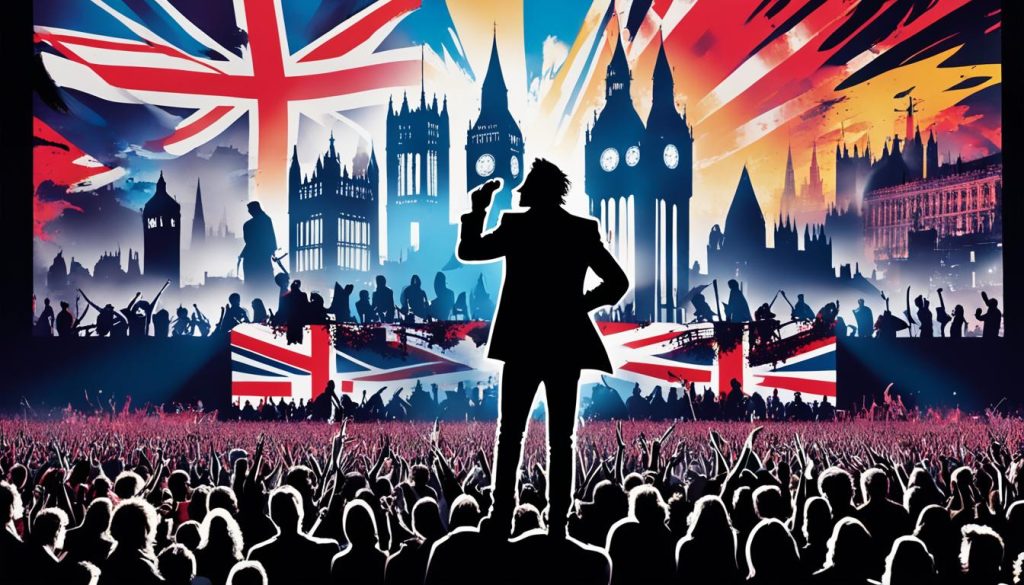
The influence of British music on the world is huge. Bands and pop artists from the UK have made big waves far from home. The Beatles, one of the biggest names from Britain, started a global craze in the 1960s. They made UK pop culture a big part of life worldwide. Their music and style began the ‘British Invasion’. This term describes the huge success of British music internationally.
After The Beatles, bands like The Rolling Stones, Led Zeppelin, and Queen kept making big impacts. They didn’t just make music; they created a lasting legacy. Even today, many musicians look up to them. British music is known for being fresh and innovative. It has played a big role in the growth of different music styles. From rock and pop to punk and new wave, it shows how versatile UK pop culture is.
- The global impact of legendary groups like The Beatles and The Rolling Stones, which still inspires musicians today
- British music’s pivotal role in the birth and proliferation of progressive rock, glam rock, and the punk movement
- Adaptation and transformation of British rock in the global scene, influencing emerging subgenres and new artists
- The persistent presence of UK pop culture icons in contemporary media and their influence on the fashion, speech, and attitudes of youth worldwide
- Today’s British artists who continue to define and redefine genre boundaries, ensuring the UK’s position at the forefront of the global music scene
The story of British music continues today. New talent from the UK keeps making its mark on the world. Bands like Radiohead and singers like Adele have followed in the footsteps of those before them. They make sure British music continues to be loved all over. The music from the UK remains a big part of many people’s lives, across the world and through generations.
Cultural Celebrations and British Festivities
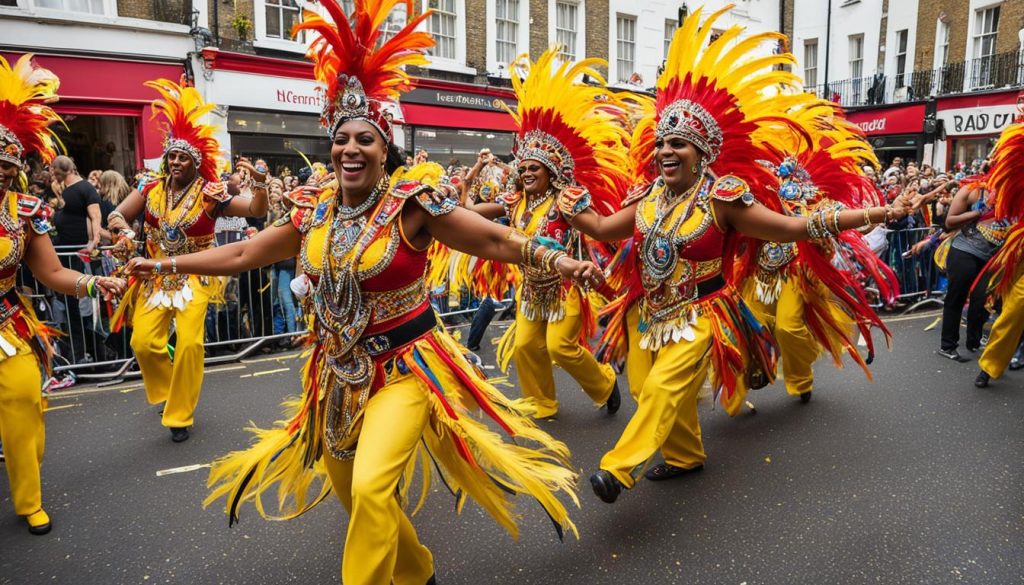
The United Kingdom has a mix of cultural celebrations. They fill the British calendar with colour and joy. Both old and new events invite everyone to experience the lively UK.
From Bonfire Night to the Notting Hill Carnival
When autumn arrives, Britain lights up with Bonfire Night. People remember the Gunpowder Plot of 1605 by lighting big bonfires and fireworks. It shows unity and strength. Then, Notting Hill Carnival brings London to life with bright costumes and music. It celebrates Caribbean culture and is one of the biggest street parties in the world.
Christmas Traditions and Festivals
Winter in the UK means Christmas traditions that warm the heart. Mulled wine, fairy lights, and carols are everywhere. Christmas markets and events spread across the country, sharing old customs with everyone.
Glastonbury and the UK’s Festival Scene
In summer, Glastonbury Festival brings people from all over. It is known for big music names and new talent. It’s seen as a must-do for many. All over the country, festivals celebrate music, arts, and community spirit.
These celebrations show the UK’s rich culture. They mix old and new, tradition and modern life. It’s a unique mix of British fun and spirit.
Facts about the UK
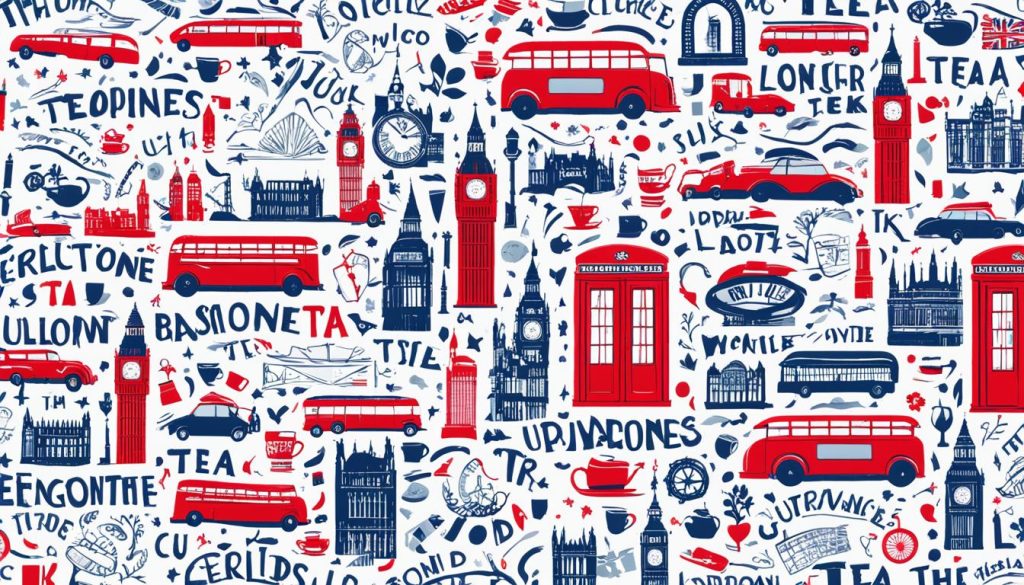
The United Kingdom combines historical richness and modern life. It’s often seen through cliched images. But, it’s more than tea, red buses, and the Royal Family. This section aims to correct those cliches with real facts. It shows UK culture is as diverse as it is influential. We’ll explore true UK customs and what it means to be British.
Combating Common Stereotypes with Truth
UK stereotypes hide many truths. The British might seem reserved, but they love celebrations. Events like Remembrance Day show their deep sense of community. Brits enjoy community and celebration in pubs and at sports events, contrary to their ‘stiff upper lip’ image.
Surprising Facts that Make the UK Unique
The UK leads in many areas, challenging stereotypes. It launched the first regulated public broadcasting. The London Zoo is the world’s oldest national zoo. Also, the UK gave the world the World Wide Web and discovered the DNA’s double helix. These facts highlight Britain’s role in global innovation.
Interesting Tidbits about British Life and Customs
British life is full of surprises beyond traditional customs. The cuisine is diverse, showcasing the UK’s multiculturalism. Dishes like Tikka Masala and Fish and Chips are beloved. Britons take part in quirky competitions like cheese-rolling. They also love allotments, showing a passion for gardening in cities.
The UK respects its traditions while embracing change. It offers a rich history, diversity, and unique aspects that are known worldwide.
The UK’s Political Structure and Parliament
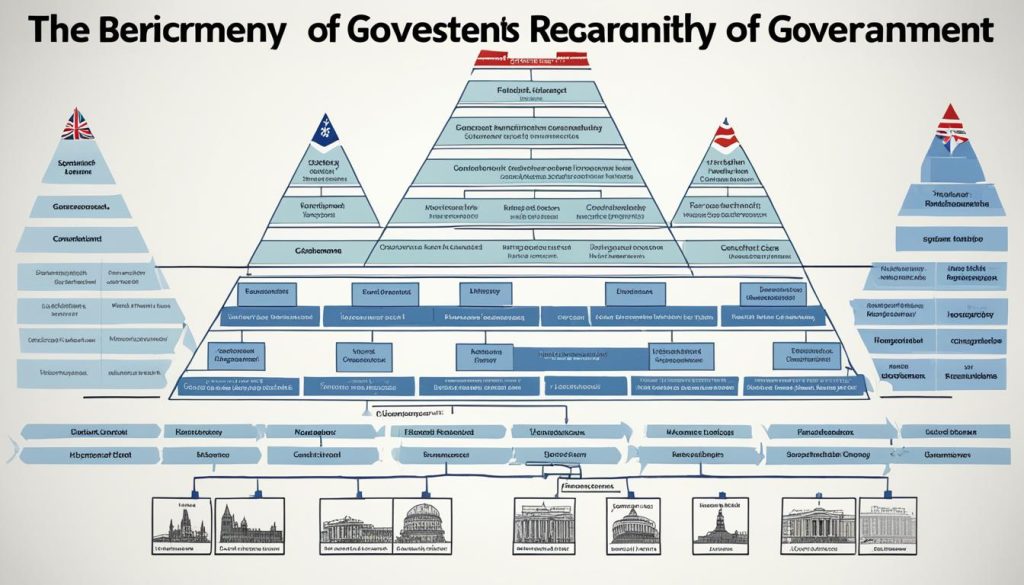
The UK political system is a detailed mix that has developed over many years. It shapes how the nation is run. At its heart is the British Parliament. This body symbolises democracy and law rule in the UK. The Parliament is made up of two parts: the House of Commons and the House of Lords. It is located in Westminster, the UK’s political hub.
The UK government structure rests on constitutional monarchy and parliamentary democracy. The monarch acts as the Head of State. Meanwhile, the Prime Minister leads the government, directing national policies and decision-making. The UK government is divided into executive, legislative, and judicial branches. Each has its own duties and powers.
- The Executive: The Prime Minister leads this part. It carries out laws, with powers given to the Cabinet and its ministers.
- The Legislature: Based in Westminster, this is the main law-making group. It checks the government’s work and discusses new laws.
- The Judiciary: This independent branch interprets laws. It makes sure justice is served through courts and tribunals.
The idea of devolution is key in the UK political system. It gives certain powers to Scotland, Wales, and Northern Ireland. This lets them handle their own matters, like education and health.
- Scottish Parliament: It manages Scotland’s powers. It can make laws on many internal issues.
- Senedd Cymru (Welsh Parliament): It has control over Welsh-specific matters. It can also pass laws in Wales.
- Northern Ireland Assembly: It deals with Northern Ireland’s own issues. It also looks at matters affecting the island of Ireland.
Knowing the Westminster model helps us understand the UK’s politics. The monarch has a mostly ceremonial role. The real democratic support is in the House of Commons. MPs here represent the people. The Prime Minister, generally from the majority party, is chosen to lead. The ‘Mother of Parliaments’ is more than just a symbol of British heritage. It actively demonstrates the UK’s dedication to democracy and good governance.
Traditional and Modern British Cuisine

The UK’s gastronomy is a mix of old and new. It’s known for hearty meals. Recently, it has embraced fusion, combining global tastes with classics like the Full English Breakfast.
The Evolution of the ‘Full English Breakfast’
A key part of British food, the Full English Breakfast fills you up with eggs, sausages, and more. It started in the UK’s farming days. Now, it’s a hit everywhere, from fancy brunches to quick eats.
Regional Specialities from Haggis to Welsh Cakes
-
Haggis is a Scottish gem that’s tasty and traditional. It’s a big part of Scottish life and food.
-
Welsh Cakes are sweet treats with currants. You can find them at markets or in Welsh homes.
The Rise of British Fusion and Michelin-Starred Restaurants
Creative chefs are mixing international flavours with British classics. The UK now has many Michelin-starred places. Their menus blend the old and new in British cooking.
The Role of the UK in Technological Advancement

The United Kingdom has been key in global tech progress. It’s known for its early role in the digital age. By honouring past and current tech minds, the UK has created prime spots for startups. R&D in the UK is leading the way in new scientific and tech discoveries.
Pioneers of the Digital Revolution and Computing
Alan Turing set the basics for modern computing. Tim Berners-Lee then invented the World Wide Web. These events showed the UK’s huge impact on global tech. They’ve made the country a digital age leader, inspiring worldwide tech growth.
Contemporary Tech Hubs and Start-Up Culture
Now, the UK boasts a lively startup scene, especially in cities like London, Manchester, and Cambridge. These areas are innovation hotspots. Here, startups thrive and push UK tech forward. Creative people in these hubs drive industry innovations.
Leading Research and Development in Various Sectors
The UK’s heavy investment in R&D shows its dedication to ongoing science and tech advancement. It’s a leader in new findings thanks to top research bodies and teamwork with industries. UK advancements cover AI, biotech, renewable energy, and more, reflecting its tech diversity.
Educational Excellence: UK’s World-Renowned Universities
The UK’s higher education shines brightly on the global stage. It’s home to prestigious places like Oxford and Cambridge. These universities draw students from everywhere, known for their tradition and innovation. The UK’s progressive education system meets today’s needs, mixing history with dynamic learning.
- The tradition of excellence at Oxford and Cambridge, with their collegiate systems, rigorous academic programmes, and commitment to research innovation.
- The wide spectrum of UK universities offering specialised courses in arts, sciences, engineering, and more, fostering an ethos of comprehensive education.
- The pivotal role that British higher education plays in cultivating industry leaders, thinkers, and innovators who shape our global society.
UK universities lead in research and technology. Their fame boosts the UK’s educational leadership. The mix of cultures on campuses makes learning richer, preparing future leaders with worldwide viewpoints.
British higher education stands out for many reasons. It offers rich opportunities for those eager to learn. These are some highlights.
- Internationally-recognised qualifications that open doors to prestigious careers worldwide.
- Centres of excellence across the nation in fields as varied as medicine, engineering, the arts, and the humanities.
- Ground-breaking research initiatives that contribute significantly to the global knowledge economy.
- A bastion of academic freedom and intellectual rigour that continues to nurture critical thinking and creativity.
The British Economy and Financial Sector
The British economy is a giant, backed by a detailed and cooperative financial system. It has a long history in banking and trading. Today, the UK is a key player in the world economy. At the heart of its financial strength is the City of London, a top financial centre.
The City of London’s Global Financial Importance
The City of London is crucial to the UK’s financial services. It has many international banks, investment companies, and the famous London Stock Exchange. Its financial activities are vital, impacting both the UK and the world.
The Strength of the Pound Sterling in International Trade
The Pound Sterling symbolises economic reliability. It’s important for the UK’s trade with other countries. The currency helps in making trade deals and sets the standard for financial dealings, keeping the UK’s trading status strong.
Emerging Markets and the UK’s Economic Strategies
The UK is focusing on building connections with new markets. This opens up chances for growth and new ideas. By using smart economic strategies, the UK aims for sustainable growth and shared success worldwide.
Protecting the Environment: The UK’s Green Initiatives
The UK leads in environmental care with strong green initiatives. Britain aims for renewable energy, protecting nature, and making new green policies. These efforts show a commitment to a healthier planet.
Renewable Energy and Sustainability Goals
The UK is making great strides in renewable energy. Wind farms power millions of homes, thanks to the North Sea winds. Solar power and tidal energy investments also play a big part.
Conservation Efforts and Biodiversity
The UK works hard to protect its wildlife and habitats. From Scotland’s peat bogs to England’s ancient forests, conservation is key. Rewilding projects and laws help protect endangered species too.
Green Policies and the Push Towards a Sustainable Future
The UK’s green policies aim to improve our way of living. The government and communities work together for eco-friendly solutions. These policies promote green innovation and sustainable transport for all.
Conclusion
We’ve journeyed through time and across lands to understand Britain’s diverse story. This nation adds much to world history, innovation, and culture. From ancient Stonehenge to towering skyscrapers, the UK blends old traditions with new progress. This mix of past and present defines Britain’s unique spirit.
Britain’s legacy of innovation is huge and impactful. It gave the world steam engines and digital networks. These inventions show Britain’s unending creative spirit. Its culture and technology have touched all parts of the globe. They continue to shape our lives in many ways today.
We’re ending this article reflecting on Britain’s various aspects. Its natural beauty, literary works, and historic sites. Its advancements in science, food, and business. All these elements come together to form a diverse and united UK. This is an invitation to explore and celebrate a nation that keeps adding to our global story. In Britain, where history speaks from all corners, may each discovery celebrate the bright future ahead.

